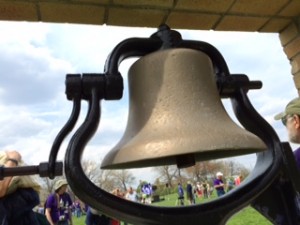There are opportunities every day to practice empathy. Yet few people take on the challenge. They may think it’s too hard to become vulnerable and allow themselves to feel a deep emotional connection to someone else’s pain. What they would find, if they were willing, is that out of that empathy comes understanding.
Two days ago, my husband and I drove to our college alma mater, Kent State University, to attend the 45th commemoration of the May 4, 1970 shootings on that campus. I felt compelled to go, even though I was still in high school on that date 45 years ago. The University plays an important role in my life. Several family members received their undergraduate degrees there. It was also the place where I met my husband, Mark, in the late 1970s.
It was a postcard day, with clear blue skies, sunshine and a gentle breeze. The lilacs, viburnum and daffodils were in spectacular bloom. It was a stark antithesis of what happened on that hallowed ground of University Commons 45 years earlier.
 The May 4 memorial sits atop a shady hillside next to Taylor Hall, where a small troop of National Guardsmen opened fire on students. At the entrance to the memorial sit three granite pavers demanding attention. Each is inscribed with one word. Inquire. Learn. Reflect. To me, they represent the essentials to practicing empathy. It reminds us that we didn’t need to be there 45 years ago to feel the impact of what happened that day.
The May 4 memorial sits atop a shady hillside next to Taylor Hall, where a small troop of National Guardsmen opened fire on students. At the entrance to the memorial sit three granite pavers demanding attention. Each is inscribed with one word. Inquire. Learn. Reflect. To me, they represent the essentials to practicing empathy. It reminds us that we didn’t need to be there 45 years ago to feel the impact of what happened that day.
Inquire. To practice empathy, an inquiring heart is required. It begins with a profound curiosity and a yearning to know about the world in which one lives. It starts with a series of open-ended questions that seek knowledge and the truth.
Learn. Response to inquiry provides the required foundation for learning and ultimately understanding. Continual learning leads to continual growth when the learning is applied and practiced. Learning can come from many sources ranging from books and scholarly journals to lived experiences.
Reflect. Reflection requires being fully present in the moment, when all distractions are averted. The mind is open to ponder information and facts and to gain perspective. Investing the time to reflect allows for a more personal understanding. Reflection can lead to more questions, deeper inquiry, learning, and so the cycle begins again. Inquire. Learn. Reflect.
As I listened to the family and friends of the four slain students, I felt profound empathy. The older sister of Bill Schroeder said “You showed up!” She said she would tell her 95-year old mother that we (the audience) showed up to remember her son and what happened that day. Our simple act of showing up had a much deeper meaning and value to one person and one family than we could imagine. You never know what your presence means.
People often confuse sympathy with empathy. The two are very different, as explained by Dr. Brene Brown in an excellent short video that’s less than three minutes. Watch it. It will change your perspective and help you understand when you’re being sympathetic when you should be empathetic.
The world needs greater empathy today. The workplace requires greater empathy today. Leaders must demonstrate greater empathy today. Before you enter the rabbit hole of name-calling and judgment of others, take time to practice empathy. Lay out the possibility in your heart and in your mind that you have the capacity to connect with someone else’s pain. Inquire. Learn. Reflect.
Photos: Christine Zust

